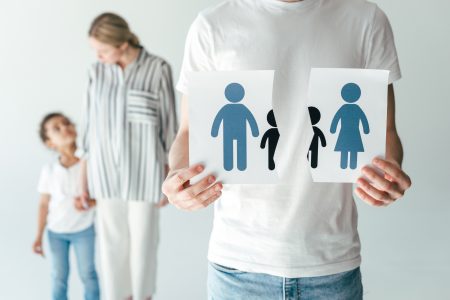 Ever wonder why the divorce rate is so high? Although every couple is unique and every situation is different, relationship experts have noticed some recurring patterns.
Ever wonder why the divorce rate is so high? Although every couple is unique and every situation is different, relationship experts have noticed some recurring patterns. 
Here are fifteen common reasons for divorce, according to a relationship expert:
1. Infidelity
This one certainly isn’t a surprise. Cheating on a partner is a huge reason for divorce, mainly due to broken trust. Whether infidelity happened once or multiple times, it’s hard to restore trust and rebuild your relationship. (Although not impossible if both partners are willing to put in the effort!)
2. Financial problems
Debt, mismatched spending patterns, or different tolerances for financial risk can definitely lead to divorce. Money is a huge stressor in relationships which can cause other areas of your relationship to feel strained. Financial stress can slowly break down the marriage, ultimately causing separation or divorce.
3. Lack of intimacy
Romantic, physical, and sexual intimacy are super important parts of any long-term romantic relationship. Though it is common for sexual intimacy to decline over time (especially after the sexually charged honeymoon phase of the relationship), it’s important that intimacy doesn’t completely disappear from your relationship. A lack of intimacy can lead couples to feel disconnected from one another, which can cause divorce.
4. Substance abuse issues
Though we normally think of substance abuse issues as an individual struggle, they have serious effects on both partners in a relationship and can often lead to divorce. Substance abuse issues are often coupled with lying, deception, and erratic behavior, which can tear down trust. Substance abuse can also lead to codependency in the relationship, which changes the overall dynamic for the worse. If you’re unable to break the cycle of codependency, it will likely lead to divorce.
5. Inability to resolve conflict
Arguing occurs in every relationship, but if partners are not able to resolve or deal with conflict in a constructive way, it can lead to resentment and eventually divorce. It’s important to work on improving communication skills to help stop your arguments from escalating to unhealthy levels.
6. Marrying too young
While there is no such thing as the perfect age to get married, there is such a thing as getting married too young. People that get married before they have solidified their identities as individuals, or if they haven’t experienced much of life on their own, may feel trapped in a marriage.
It’s important to live your life to the fullest or at least accomplish what you want to as a single person before getting married. If both partners are not excited about being married, this attitude can bleed into all aspects of the relationship and cause a marriage to end in divorce.
7. Marrying for the wrong reasons
People that get married for the wrong reasons often end up divorcing their partner after realizing they’re not truly compatible in the long term. Marriage is about love, commitment, shared values, and a vision for the future. If you get married for the wrong reasons (i.e., because it’s what your friends are doing or you feel pressure from your family), the effort involved in maintaining the marriage just won’t seem worth it, which can lead to divorce.
8. Abuse
Emotional and physical abuse can certainly lead to divorce. When either happens, it’s difficult to end the abusive cycle and turn your toxic relationship into a healthy one. Though it is not impossible to move past abuse in a relationship, it is uncommon given the relationship dynamic.
9. Differing values, interests, and priorities
Marriage is about sharing your life with someone, which requires being on the same page about your values, interests, priorities, and goals. It’s impossible to have a successful or lasting relationship if you’re not, which ultimately leads to divorce.
10. Lack of communication
In addition to trust, communication is at the core of any successful relationship. If you and your partner are not able to communicate effectively, the relationship is not going to work out! This includes everything from expressing your wants and needs in the relationship, setting healthy boundaries, and learning to resolve conflict. Without good communication, other areas of your relationship can suffer, leading to divorce.
11. Unrealistic expectations
Marriage is hard! It’s important for people to realize the amount of work it takes to make it work. If you and your partner go into a marriage with unrealistic expectations and expect that everything will be fun and easy, then you won’t be prepared for the realities of a lifelong partnership. This can eventually lead to divorce.
12. Lack of equality
Above all else, marriage should be a partnership between equals. Sure, you and your partner will bring different things to the table, but it’s important that your contributions are equally respected and that you both have a voice and a say in the relationship. If there is a lack of equality in the relationship, partners can feel overlooked and underappreciated which can lead to feelings of resentment and divorce.
13. Differing thoughts about starting a family
When partners are not on the same page about having children (whether it’s through natural birth, adoption, fostering, etc.), it can lead to huge problems in a relationship. Thoughts about starting a family are fundamental to spending the rest of your lives together, and not something that should be compromised. (Which is why it’s important to discuss it before you tie the knot.) If you and your partner have differing thoughts about starting a family, this can be a real reason for divorce.
14. Parenting style differences
If you and your partner do start a family or do have parenting responsibilities from past relationships, it’s important that you have compatible parenting styles. Disagreements about the approach to parenting can lead to divorce if couples are not able to communicate and get on the same page. Parenting relates to religious beliefs, morals, expectations of responsibility, views on punishment, and conflict resolution. Some of these beliefs are only made apparent when parenting, and differing views have the potential to undermine the foundations of your relationship.
15. Problem-solving in your relationship
If things are not going well in the relationship, or if you want to make improvements to your relationship, it’s important that you and your partner are on the same page about how to approach any problems. Therapy is an excellent option for couples that are looking to improve their relationship, but it requires both partners to be open to the process. If you and your partner are not on the same page about how to approach problems in your relationship, then your relationship may end in divorce.
Using The Relish App
While all of these things could lead you and your partner to divorce, not all of these reasons have to end in divorce. It’s possible to work through almost all marital problems and salvage your relationship, especially when you have the help of relationship experts on your side. Relish is a relationship coaching app that helps couples evaluate their relationship and set and achieve relationship goals. (All from your phone!)
Marriage isn’t an easy journey by any means, but if you’re both committed to a life-long partnership, you can work through just about anything to avoid divorce and keep your relationship thriving.
WATCH:
